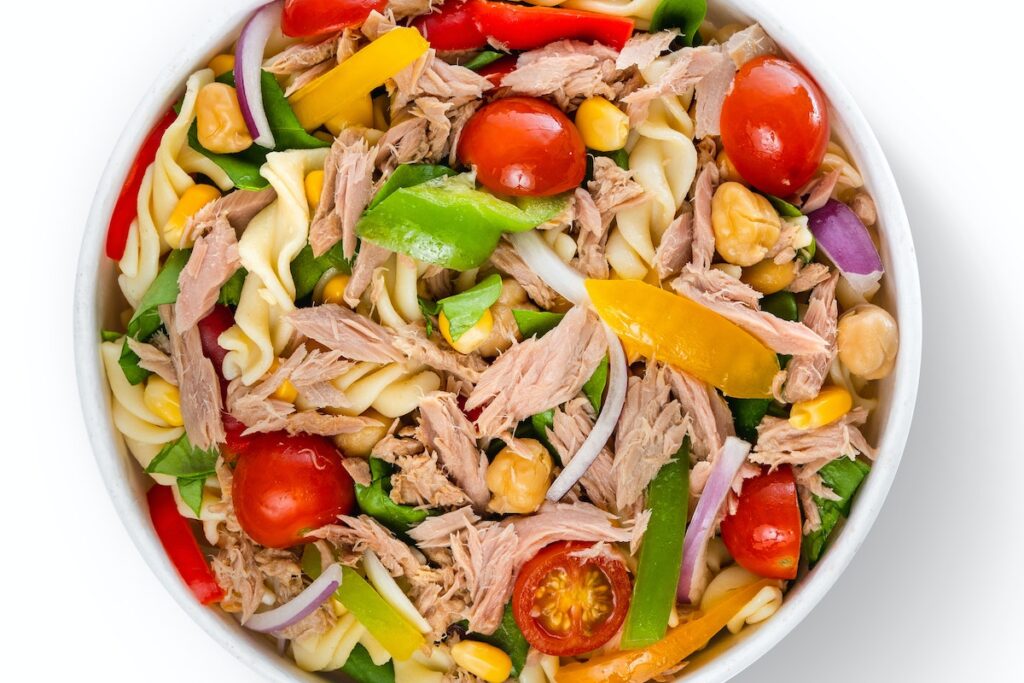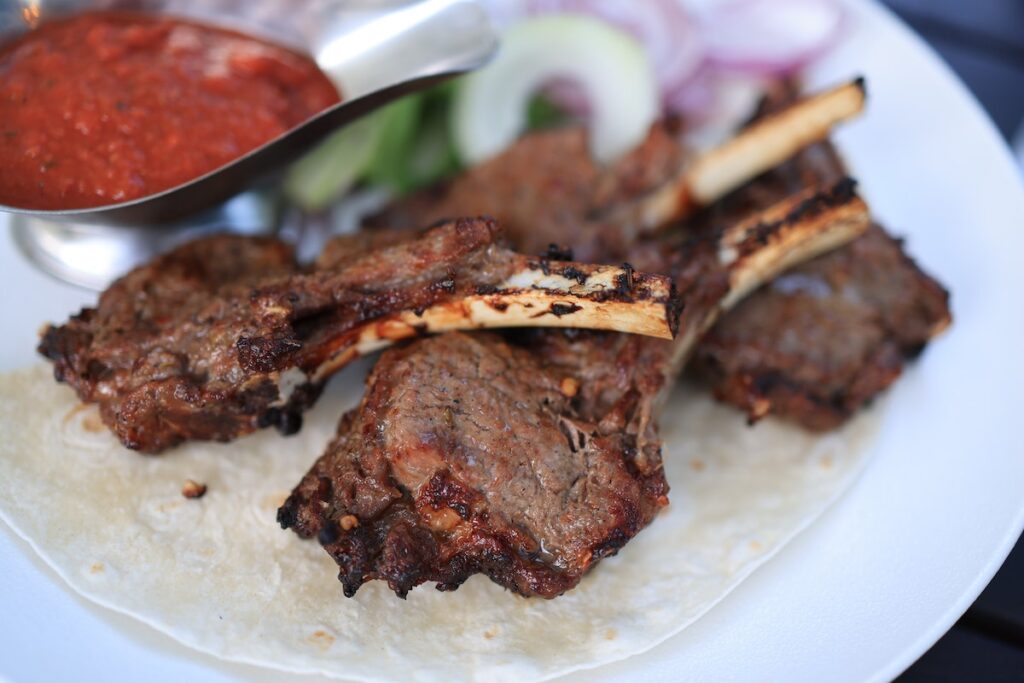Easy and Delicious 7-Day Mediterranean Meal Plan

Many of us have heard of Mediterranean meal plans, often lauded as the epitome of healthy eating. With the evocative imagery of fresh fish, olive oil, ripe tomatoes, and crisp salads, these meal plans are more than just a fleeting food trend. They embody a lifestyle change that champions balance, variety, and the use of fresh, nutrient-dense ingredients.
Don’t let the name fool you… Mediterranean meal plans aren’t about exotic dishes that are difficult to prepare. They’re about incorporating simple, healthy foods into your routine that not only tantalize your taste buds but also contribute to your overall wellness. Whether you’re a seasoned foodie or a kitchen novice, our weekly Mediterranean meal plans promise to guide you toward a healthy, balanced lifestyle without compromising on taste or satisfaction.
What are the benefits of a Mediterranean meal plan?
The Mediterranean diet has been widely recognized for its various health benefits, mainly due to its emphasis on whole foods, lean proteins, healthy fats, fruits, and vegetables. It’s particularly revered for its role in reducing the risk of numerous chronic diseases. It has also been recognized by the U.S. News & World Report as the best diet.
Its high fiber content, healthy fats, and antioxidants work together to combat the oxidative stress that can lead to cellular damage and cancer development.
The diet is abundant in healthy fats, minimizes the intake of harmful saturated fats, and includes a wealth of fiber sourced from fresh fruits, vegetables, and whole grains, all of which contribute to enhanced cardiovascular health. Furthermore, the diet has been linked to lower rates of certain cancers.
The Mediterranean diet, rich in neuroprotective nutrients, is also known for helping manage neurodegenerative diseases like Parkinson’s and Alzheimer’s. It supports weight control and heart health with its focus on whole foods and the ability to regulate blood pressure and cholesterol.
How to shop for the Mediterranean diet
Shopping for the Mediterranean diet involves prioritizing fresh, whole foods and minimizing processed items. Fill your cart with a variety of fruits and vegetables, focusing on local and seasonal produce. Opt for whole grains, lean proteins like poultry, fish, and legumes, and healthy fats from sources like olive oil, avocados, and nuts.
Include low-fat dairy, like Greek yogurt and feta cheese, and aim to eat seafood at least twice a week. Stock up on herbs and spices for flavor, and if you consume alcohol, red wine is included in moderation. Always plan your meals and shopping list in advance to avoid impulse buying.
7-day Mediterranean meal plan
Here’s a simple Mediterranean meal plan for a week, including breakfast, lunch, and dinner. Snacks can include things like fresh fruit, nuts, olives, and yogurt.
Day 1
- Breakfast: Greek yogurt with honey and mixed berries
- Lunch: Tuna salad with olives, tomatoes, cucumbers, feta, and a lemon vinaigrette
- Dinner: Grilled chicken kebabs with tzatziki sauce, side of quinoa

Day 2
- Breakfast: Whole grain toast with avocado and poached egg
- Lunch: Lentil soup with a side of whole-grain pita
- Dinner: Baked salmon with lemon, dill, and a side of roasted vegetables
Day 3
- Breakfast: Oatmeal with sliced almonds and dried figs
- Lunch: Greek salad with whole-grain pita
- Dinner: Shrimp sautéed with garlic, tomatoes, and feta served over whole grain pasta
Day 4
- Breakfast: Greek yogurt with granola and fresh fruit
- Lunch: Hummus and vegetable wrap in a whole grain tortilla
- Dinner: Grilled lamb chops with couscous and grilled vegetables

Day 5
- Breakfast: Whole grain toast with almond butter and banana slices
- Lunch: Chickpea salad with tomatoes, cucumber, feta, and a lemon vinaigrette
- Dinner: Baked cod with olive tapenade, side of quinoa
Day 6
- Breakfast: Scrambled eggs with feta and spinach, side of whole grain toast
- Lunch: Quinoa salad with grilled vegetables and a balsamic vinaigrette
- Dinner: Chicken souvlaki with Greek yogurt sauce, side of brown rice
Day 7
- Breakfast: Oatmeal with honey, walnuts, and fresh berries
- Lunch: Tabbouleh salad with a side of hummus and whole-grain pita
- Dinner: Baked eggplant and tomato with feta cheese, side of couscous
Tips for following a Mediterranean meal plan
Creating and following a Mediterranean meal plan doesn’t need to be a daunting task. It can be as simple as making small, manageable changes over time. Here are some tips and strategies you can follow:
- You can start by gradually increasing the number of fruits and vegetables they consume each day. This could be by adding an extra serving of vegetables to lunch and dinner or opting for fruit as a snack.
- Switching from refined to whole grains can also have a significant impact. Whole grains like brown rice, oatmeal, and whole-grain bread or pasta are more nutritious and filling than their refined counterparts.
- Another important change is replacing unhealthy fats with healthier ones, particularly olive oil, a cornerstone of the Mediterranean diet.
- Red meat is consumed less frequently in a Mediterranean meal plan, so try to limit its consumption and replace it with fish, poultry, or plant-based proteins
Frequently asked questions (FAQ)
Got more questions about Mediterranean meal plans? Check out some commonly asked questions about this topic below.
What types of food form the core of the Mediterranean diet?
The Mediterranean diet centers on fresh produce like fruits, vegetables, and whole grains, complemented by lean proteins such as fish and poultry, and healthy fats like olive oil. Nuts and legumes are also integral, while dairy products, red meat, and sweets are generally limited.
Is it challenging to transition to Mediterranean meal plans?
Switching to a Mediterranean diet can be surprisingly simple. Start by incorporating more fruits, vegetables, and whole grains into your meals, and try using olive oil as your primary fat. Gradually, you can decrease your consumption of red meat and processed foods.
How does one maintain variety in a Mediterranean diet?
The Mediterranean diet is naturally diverse, incorporating a broad range of food groups. You can experiment with different types of fruits, vegetables, grains, and proteins to keep your meals exciting. Try new recipes, explore different seasonings, and remember – moderation is key.
Final Word
Embarking on a journey with Mediterranean meal plans can indeed be a life-changing decision. With an array of wholesome foods and an emphasis on balanced lifestyle habits, this way of eating can bring about numerous health benefits while keeping your meals exciting and satisfying. But how do you envision your transition to Mediterranean meal plans?
If this guide has been a helpful resource for you, why not spread the word? Your friends or family might also be interested in adopting this healthful and flavorful diet. For even more insights and tips on embracing a healthier lifestyle through diet, be sure to explore the rest of our blog. Your journey towards wellness doesn’t have to be walked alone. Let’s take these steps together.
